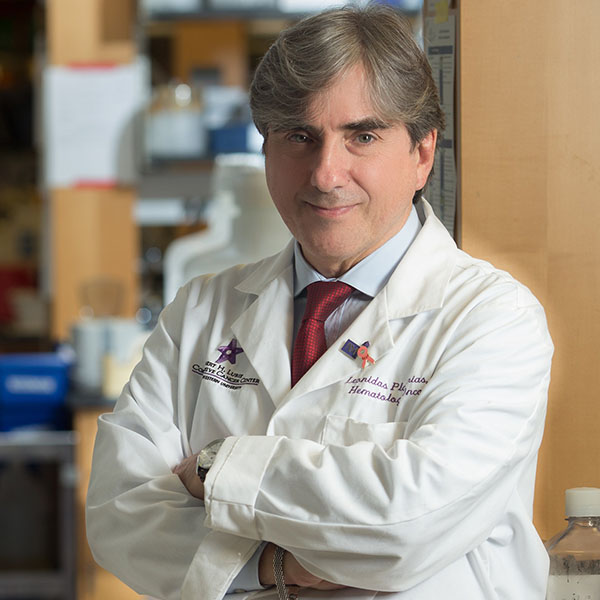
Leonidas Platanias, MD, PhD
Director, Lurie Cancer Center
Dear Friends and Colleagues,
In 2023, the Robert H. Lurie Comprehensive Cancer Center of Northwestern University continued to advance our understanding of cancer. Our goal, every day is to save and improve lives.
As a National Cancer Institute-designated Comprehensive Cancer Center, our physicians and scientists are translating discoveries into new possibilities — offering the newest, most effective treatments through clinical trials, sharing vital education and services in the larger community, and providing state-of-the art cancer services and ongoing support to patients and families across Northwestern Medicine.
Our Year in Review highlights some of these impactful achievements and the people who make them possible.

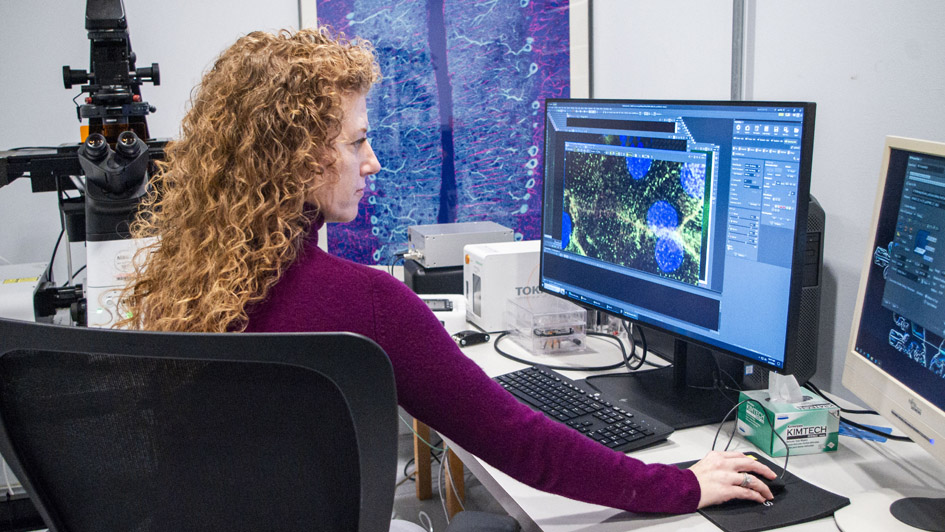
Guided by our mission to prevent and defeat cancer, director Leonidas Platanias, MD, PhD, and a world-class leadership team are transforming how we think about cancer.
Lurie Cancer Center’s status as a National Cancer Center (NCI) - designated Comprehensive Cancer Center reflects the depth and breadth of our collaborative research, spanning 29 academic departments and divisions across four schools at Northwestern. In addition to our Basic, Clinical and Population Sciences Research Programs, Lurie Cancer Center supports a diverse range of innovative research hubs and key initiatives focused on exploring new ways to bridge these scientific areas.

The Chan Zukerberg Initiative selected Northwestern University to co-lead its new biomedical research hub in Chicago, uniting investigators to study human tissue with unprecedented resolution. Shana O. Kelley, PhD, co-leader of Lurie Cancer Center’s Cancer & Physical Sciences Program, is the hub’s president.
In 2023, Lurie Cancer Center received a renewed $10.8 million Specialized Program of Research Excellence (SPORE) grant from the NCI to advance translational research and improve outcomes for patients with brain cancer.
A cornerstone of the NCI's efforts to promote collaborative, interdisciplinary research, SPORE grants support basic and clinical scientists working together on new and diverse approaches to the prevention, early detection, diagnosis, and treatment of cancer.
Lurie Cancer Center has two NCI-funded SPOREs:
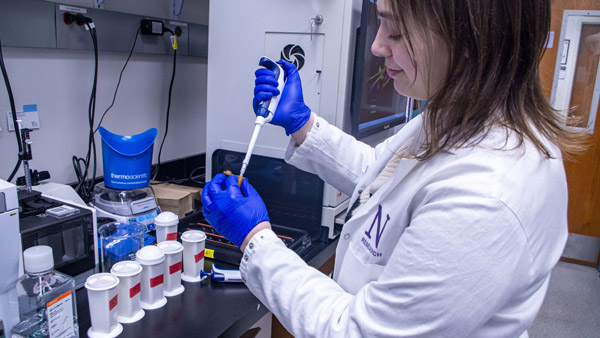
The Lurie Cancer Center Brain Tumor SPORE is led by Maciej Lesniak, MD, Professor and Chair of the Department of Neurosurgery, with projects led by members of the Departments of Neurosurgery and Neurology. It's one of just six in the U.S., and the only one in Illinois.

The Lurie Cancer Center Prostate Cancer SPORE is led by co-Principal Investigators, Sarki Abdulkadir, MD, PhD, Professor of Urology, and Maha Hussain, MD, Professor of Medicine in the Division of Hematology and Oncology. It's one of only seven in the country, and the only one in Illinois.
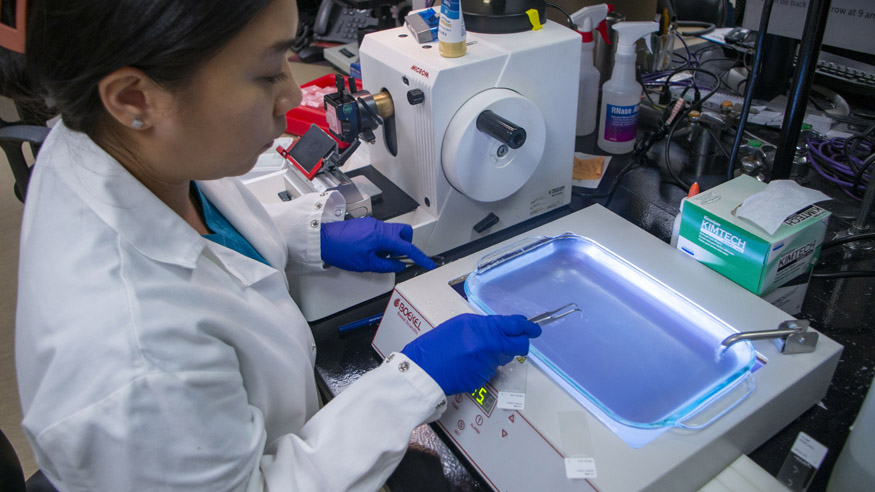
The Lurie Cancer Center provides scientific leadership in developing and conducting NCI-funded clinical research within the National Clinical Trials Network (NCTN). Based on our demonstrated expertise, our members serve as chairs and co-chairs of the NCTN steering committees committed to setting strategic priorities and increasing collaboration at an early stage of clinical trial development.
The Clinical Trials Office, led by Devalingam Mahalingam, MD, PhD, provides a centralized resource to conduct and coordinate Phase I through Phase III clinical trials, with more than 300 interventional clinical trials investigating a full spectrum of novel diagnostic and treatment strategies.
Learn more and search cancer clinical trials at Lurie Cancer Center
As part of the Big Ten Cancer Research Consortium, a network of academic institutions working together on collaborative clinical trials, we foster a unique team culture to drive science rapidly from ideas to improve the lives of patients in the diverse communities we serve.
“We are curing more cancers and we are extending life for many more people,” said Maha Hussain, MD, deputy director of the Lurie Cancer Center. “All of that did not happen accidentally, and it didn’t happen because of wishful thinking. It happened because of clinical trials.”
Watch this video about our collaborative clinical trials teams
Our investigators benefit from access to strong infrastructure for interdisciplinary programs and initiatives, including 14 shared resources and facilities that foster basic, clinical and population science research programs. Designed to catalyze interdisciplinary translational research, the goal of our Translational Bridge Program is to propel basic science research into clinical trials and educate a new generation of translational investigators by supporting teams made up of a trainee paired with a laboratory scientist and a clinical investigator.
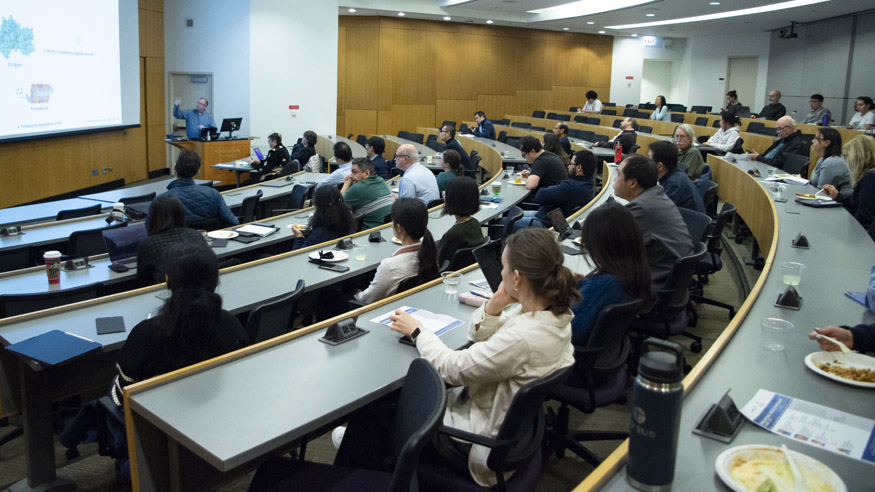
Lurie Cancer Center’s annual Translational Bridge Symposium is held to spark collaboration and inform Northwestern’s research community about translational opportunities. Read about the 2023 Symposium
Watch this video to see how our doctors are changing lives.
Below, explore some of the transformative breakthroughs from the last year. Read more high-impact stories in the Lurie Cancer Center News Archive.
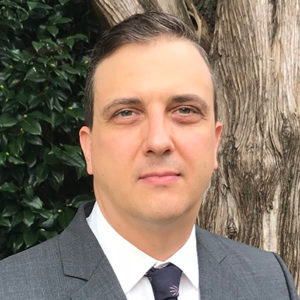
A new AI tool may make it possible to spare breast cancer patients unnecessary chemotherapy treatments by using a more precise method of predicting their outcomes.
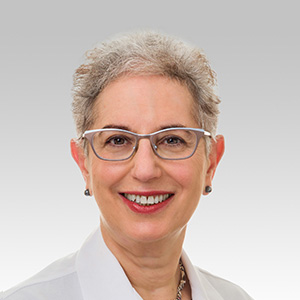
Adding a checkpoint inhibitor to conventional ifosfamide, carboplatin, and etoposide (ICE) chemotherapy improved outcomes for patients with relapsed or refractory classic Hodgkin lymphoma, according to a phase II clinical trial.
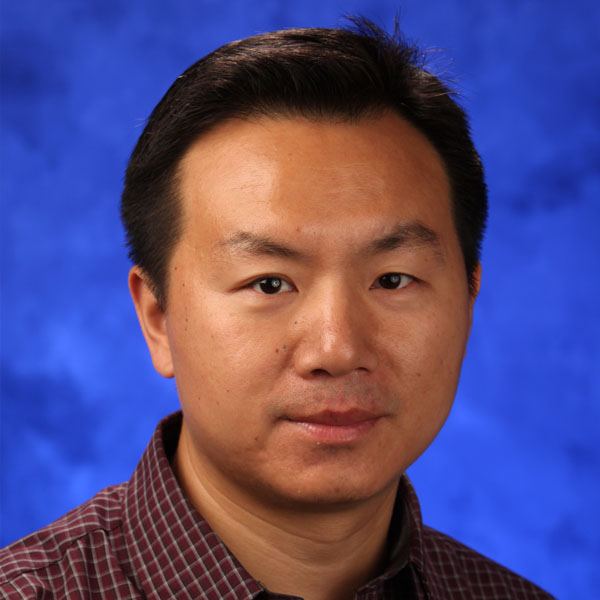
A novel, skull-implantable ultrasound device uses microbubbles to open the blood-brain barrier to treat glioblastoma in humans.
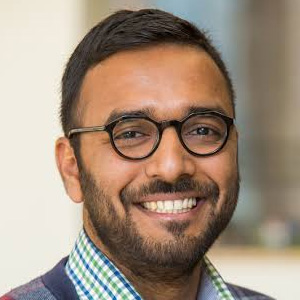
A new synthetic biology approach created a “QR code for cancer cells,” to answer a key question in cancer research.
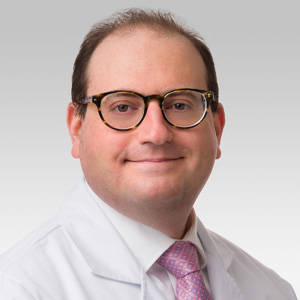
Combining immunotherapy with radiation could be a promising treatment option for patients with advanced soft tissue sarcoma.

Novel intercellular “crosstalk” between cells that promote cancer growth and metastasis could also serve as biomarkers for early detection.
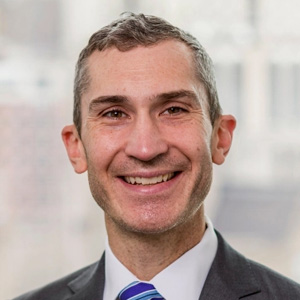
Scientists have developed a biomarker signature test to predict which tumors will respond to immunotherapy.

A specific complex that drives cell proliferation could serve as an ideal therapeutic target for patients with mutated myeloproliferative neoplasms (MPNs).
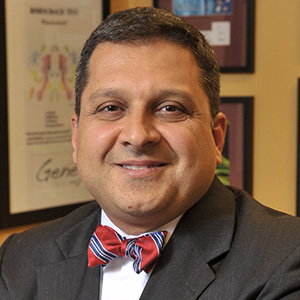
A novel vulnerability identified in a subset of genes commonly mutated in cancer, could represent a potential treatment direction for cancers that share these specific mutations.
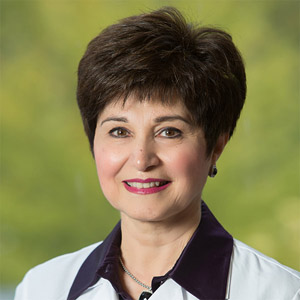
Combining a new hormone therapy drug with chemotherapy and another hormone therapy increased overall survival in patients with metastatic hormone-sensitive prostate cancer.
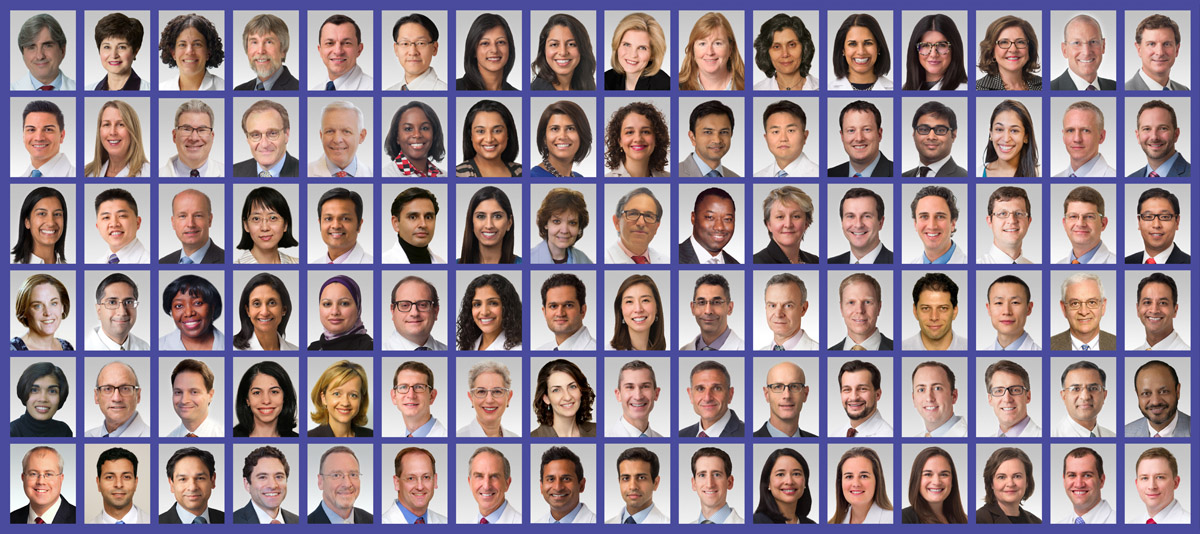
Lurie Cancer Center's faculty is comprised of clinicians and scientists from Northwestern University Feinberg School of Medicine, McCormick School of Engineering and Applied Sciences, Weinberg College of Arts and Sciences, and other academic units. Together they bring their combined knowledge and expertise directly to our patients at Northwestern Memorial Hospital, Ann & Robert H. Lurie Children's Hospital of Chicago, Shirley Ryan AbilityLab, and the Jesse Brown VA Medical Center.

Lurie Cancer Center member, Susan Quaggin, MD, the Charles Horace Mayo Professor of Medicine, chief of Nephrology and Hypertension in the Department of Medicine, and director of the Feinberg Cardiovascular and Renal Research Institute, was named chair of the Department of Medicine. She also serves as Physician-in-Chief at Northwestern Memorial Hospital and Northwestern Medical group.
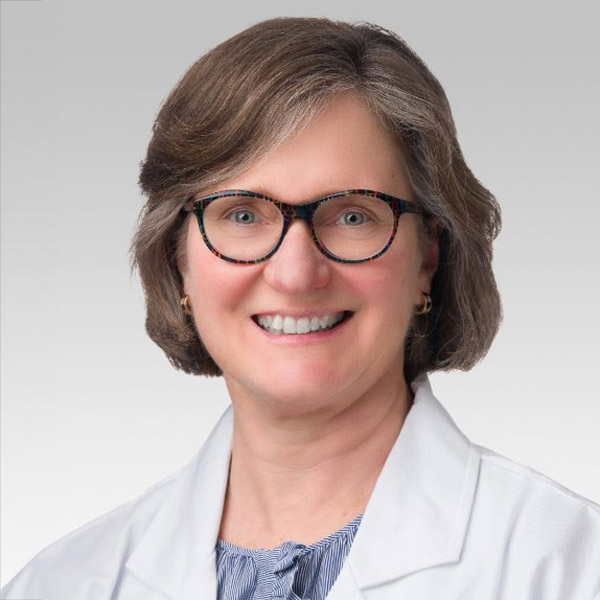
The Lurie Cancer Center is pleased to welcome Lucy A. Godley, MD, PhD, as the inaugural director of our Jeff and Marianne Silver Family Blood Cancer Institute. A nationally recognized expert in the treatment of patients with leukemia and myelodysplastic syndromes, Dr. Godley will also serve as Clinical Director of Cancer Genetics.
Lurie Cancer Center congratulates our highly innovative thought leaders who are transforming cancer research and treatment around the world. Learn more about some of their prestigious honors and national leadership roles, including:
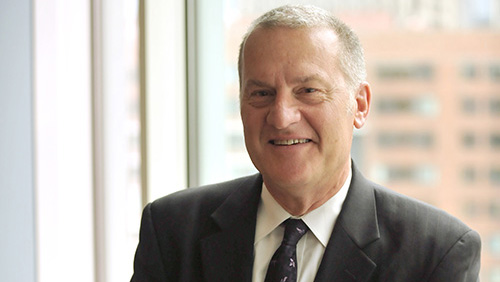
David Cella, PhD, leader of Lurie Cancer Center’s Population Science Research Programs, was named the winner of the 2023 Tripartite Legacy Faculty Prize in Translational Science and Education. Read more
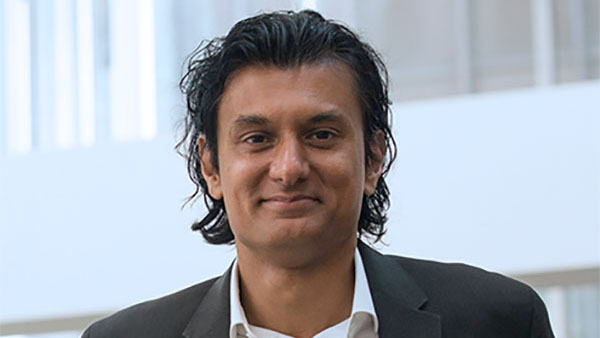
Lurie Cancer Center member Navdeep Chandel, PhD, was named a recipient of the 2023 Lurie Prize in Biomedical Sciences by the Foundation for the National Institutes of Health (FNIH) for “important and distinct discoveries in the field of mitochondrial science. Read more
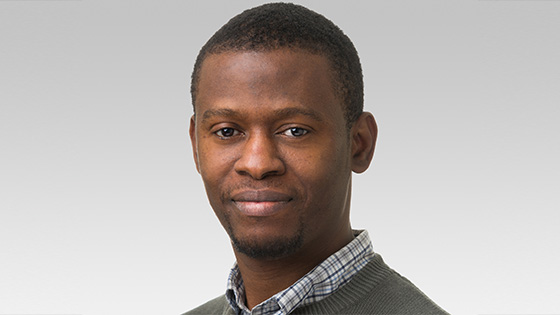
Mario Shields, PhD, a member of the Lurie Cancer Center, received the NCI's Cancer Moonshot Scholar Award. The NCI awarded $5.4 million to support the first 11 Cancer Moonshot Scholars, a new program that aims to advance cancer science while also diversifying the pool of early-stage investigators and approaches to research that NCI funds. Read more
Nine Lurie Cancer Center members were named to the 2023 list of Highly Cited Researchers published by Clarivate Analytics. "Our innovative research teams are driving advances in scientific knowledge and discovery," said Leonidas Platanias, MD, PhD. "I congratulate our highly cited faculty for their global impact against cancer."
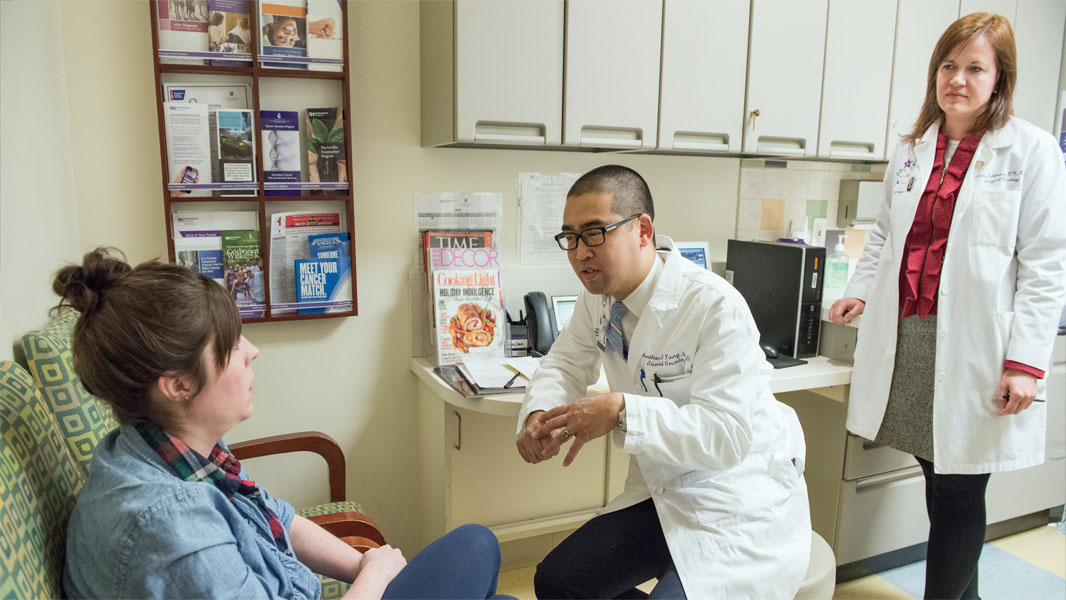
The Lurie Cancer Center at Northwestern Memorial Hospital is dedicated to caring for each patient from diagnosis through treatment to rehabilitation. Our specialists provide the full spectrum of medical, surgical and radiation oncology treatment options, as well as exciting new immunotherapy approaches (including CAR T-cell therapy), precision medicine, interventional radiology, the region's largest stem cell transplant program, and advanced technologies to improve diagnosis and treatment. They continue to extend the reach of emerging cellular therapies that help the immune stem fight cancer through the Matthews Center for Cellular Therapy, the Rube Walker Blood Center, and the Clinical Research Unit.
Our comprehensive Supportive Oncology Program and a wide range of specialized programs and services support state-of-the-art cancer treatment and the overall well-being of our patients and families.
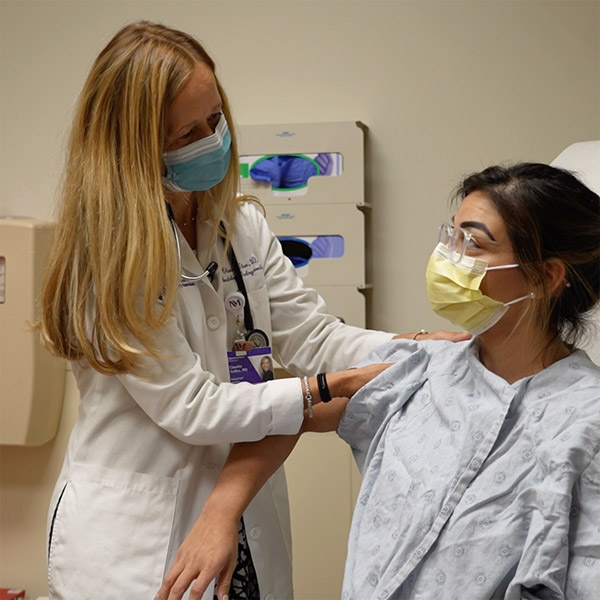
Led by medical oncologist Claudia Tellez, MD, the Lurie Cancer Center Hispanic Breast Cancer Clinic is breaking down barriers to breast cancer screening, treatment and research.
“Many Hispanic women in Chicago struggle to access care or are not receiving the highest standard of care because of language barriers, financial limitations and other factors,” says Dr. Tellez. “Our team is dedicated to addressing these disparities and improving access by providing culturally sensitive care, bilingual support and educational resources tailored to the needs of Hispanic patients.”
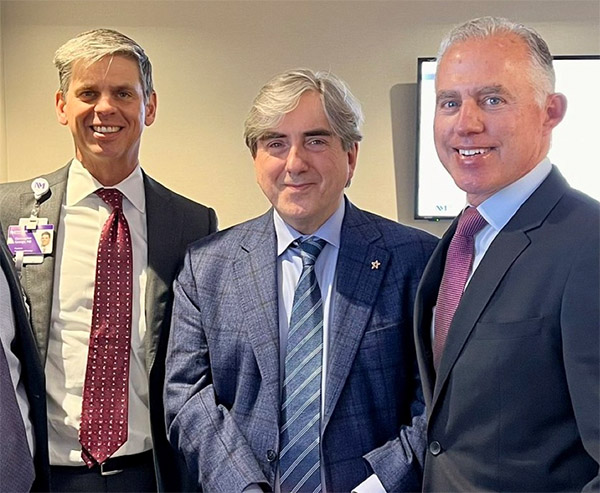
At Lurie Cancer Center, our commitment to providing patients with seamless, state-of-the-art cancer care can be seen across Northwestern Medicine. By extending our innovative treatment approaches and integrating clinical teams across the cancer care network, we are able offer patients the same highly coordinated care and novel therapies they have come to expect no matter were they enter our health system.
Led by Leonidas Platanias, MD, PhD, the Clinical Cancer Executive Council was established to guide and facilitate collaboration. Dean Tsarwhas, MD; Christopher George, MD; and Alan Wan, DO, are an integral part of the process to integrate oncology teams across all locations of cancer care at Northwestern Medicine, including a new outpatient center in Old Irving Park.
To ensure that more patient have access to the best treatment options available, Lurie Cancer Center has successfully intergrated all locations of cancer care across Northwestern Medicine into our clinical trials operations – a fundamental part of our role as a Lead Academic Participating Site (LAPS) within the NCI's National Clinical Trials Network. We are excited about plans for additional locations that will enable us to better serve our communities and eliminate disparities in cancer care.
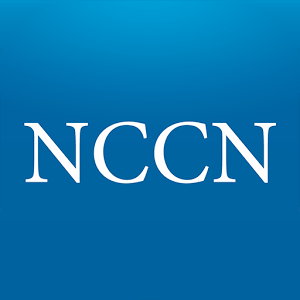
As a founding member of the National Comprehensive Cancer Network (NCCN), an alliance of leading cancer centers devoted to patient care, research and education, Lurie Cancer Center is defining, improving and facilitating effective and accessible cancer care so all patients can live better lives.
Our experts help to develop and update the NCCN Clinical Practice Guidelines, recognized as the standard for evidence-based cancer treatment throughout the world.
In this podcast, William Gradishar, MD, discusses our role in creating and refining the NCCN Guidelines.
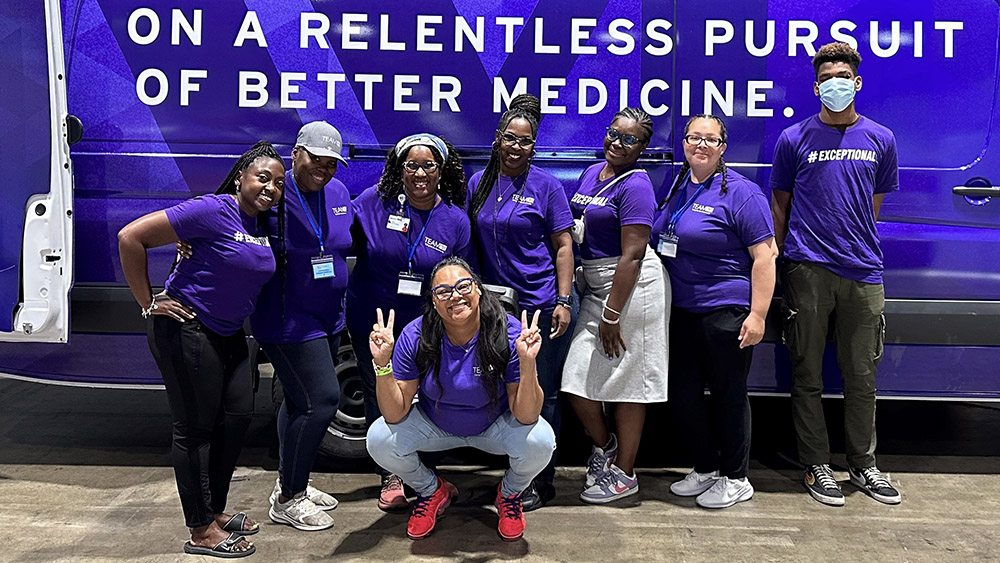
Lurie Cancer Center has a deep and long-standing commitment to advocacy, education, outreach and engagement. Together with our community collaborators, researchers and expanding networks, we are leading initiatives to make a meaningful impact on health and well-being in and beyond the communities we serve.
Our community partnerships benefit from shared priorities and programs to identify and address cancer disparities and improve outcomes in traditionally underserved neighborhoods. Led by Associate Director of Community Outreach and Engagement, Melissa Simon, MD, MPH; Assistant Directors, Marquita Lewis-Thames, PhD, and Adam Murphy, MD, MBA, MSCI; and Administrative Director, Tarneka Manning, MEd, Lurie Cancer Center's Office of Equity and Minority Health (OEMH) is focused on reducing the burden of cancer in our large and diverse catchment area.
Working together with new and existing community organizations, our efforts include:
Expanding our understanding of biological factors and social drivers of health is vital to achieving cancer health equity. A few examples of our work are highlighted below:
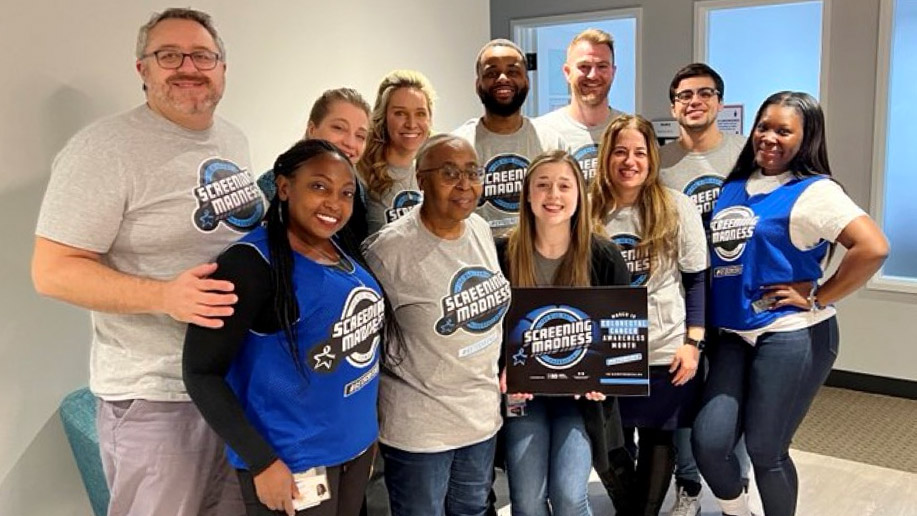
In 2023, Lurie Cancer Center teamed up once again with the Blue Hat Foundation for Colorectal Cancer Awareness and the Big Ten Cancer Research Consortium to spread the word that screening saves lives!
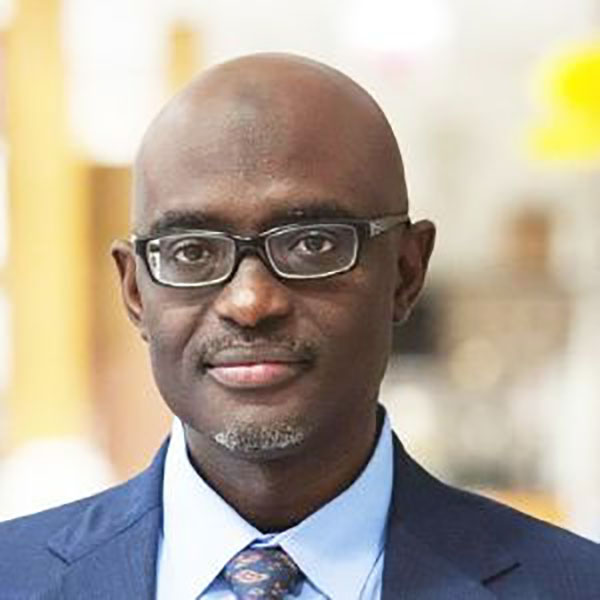 As Associate Director of Diversity, Equity and Inclusion at the Lurie Cancer Center, Sarki Abdulkadir, MD, PhD, is leading efforts to increase the diversity of the research workforce and promote career-enhancing research opportunities for early-and mid-career investigators from diverse backgrounds. In this newly created role, he works closely with Assistant Directors. Jonathan Moreira, MD, and June McKoy, MD, MPH, JD, MBA, to foster an equitable and inclusive environment throughout the Lurie Cancer Center.
As Associate Director of Diversity, Equity and Inclusion at the Lurie Cancer Center, Sarki Abdulkadir, MD, PhD, is leading efforts to increase the diversity of the research workforce and promote career-enhancing research opportunities for early-and mid-career investigators from diverse backgrounds. In this newly created role, he works closely with Assistant Directors. Jonathan Moreira, MD, and June McKoy, MD, MPH, JD, MBA, to foster an equitable and inclusive environment throughout the Lurie Cancer Center.
The Lurie Cancer Center Diversity Scholars Program was established to actively support the growth and success of high achieving, academically ambitious postdoctoral fellows and non-tenure track faculty who are underrepresented in medicine.
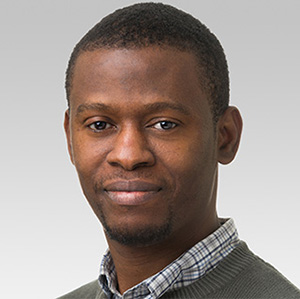
Mario Shields, PhD, a research assistant professor of Medicine in the Division of Hematology and Oncology, received the first Diversity Scholars Award. This new initiative has committed to providing Dr. Shields with $75,000 support per year for three consecutive years, along with individualized mentorship to further his research aimed at understanding the mechanisms of pancreatic cancer development and progression.
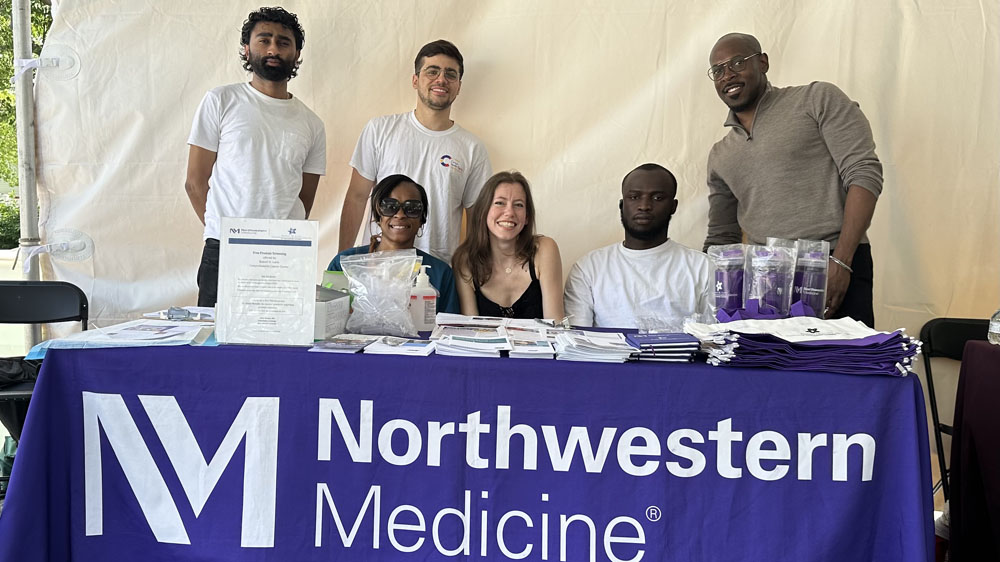
Throughout the year, Lurie Cancer offered a wide range of educational workshops, webinars and interactive opportunities for cancer patients to learn, connect and make informed decisions about their care.
Programs and events included:
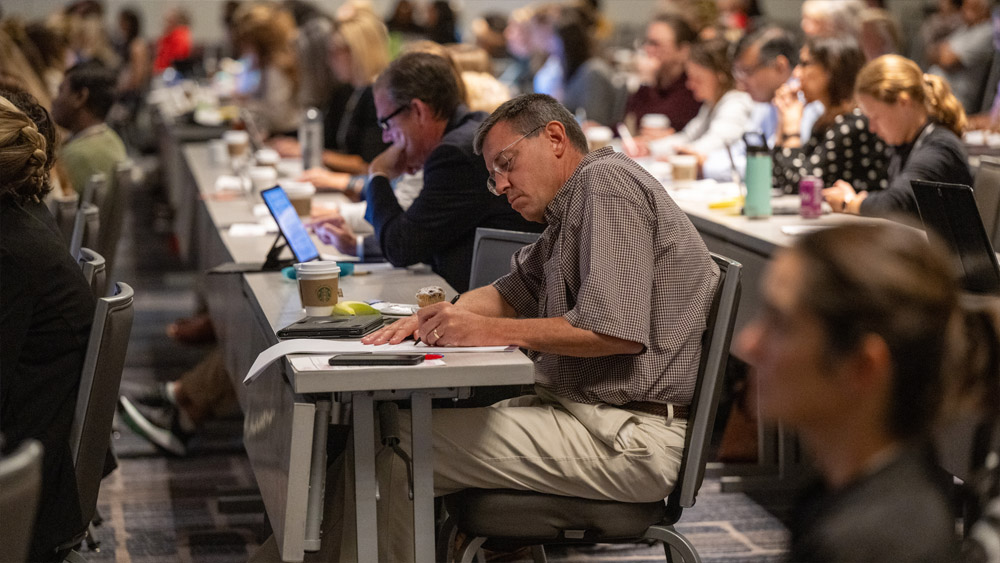
Lurie Cancer Center provides a variety of educational opportunities to advance professional development and training throughout the year. In 2023, nearly 200 distinguished speakers from other academic institutions and more than 175 thought leaders from across Northwestern shared expert perspectives and information on innovations in cancer research and treatment.
Educational opportunities included:
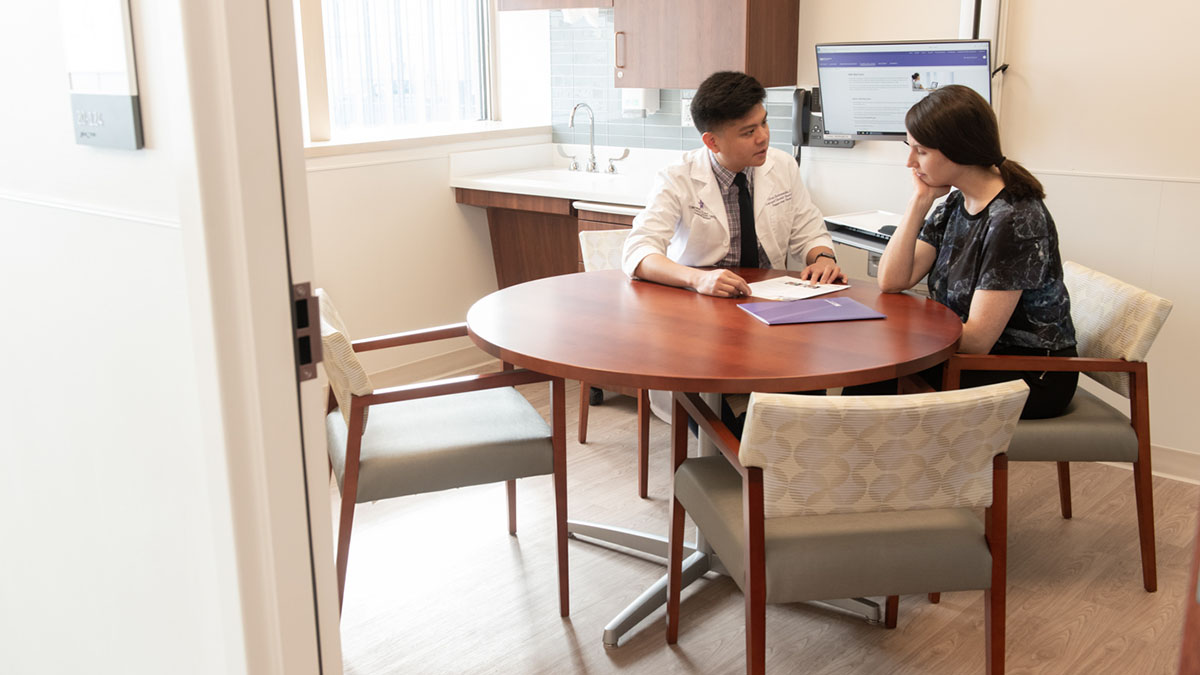
In 2023, Sofia Garcia, PhD, was named director of the Cancer Survivorship Institute of the Lurie Cancer Center. The Cancer Survivorship Institute help patients transition to life after cancer with a wide range of services, including treatment summaries, care plans that include steps for follow-up care, and tools to manage the physical and emotional challenges. An evidence-based approach to symptom monitoring was introduced to help connect patients with personalized services and supportive care.
Disease-specific survivorship clinics within the Cancer Survivorship Institute include the Lynn Sage Breast Cancer Survivorship Program, as well as Lurie Cancer Center’s Adolescent & Young Adult Cancer Program and the STAR Program (Survivors Taking Action and Responsibility) for adult survivors of childhood cancer.
Our Supportive Oncology Program provides emotional and practical support for Lurie Cancer Center's patients and families coping with the challenges of diagnosis, treatment and recovery. A multidisciplinary team, including oncology social workers, psychologists, dietitians, a fertility preservation navigator, palliative care clinicians, adolescent and young adult (AYA) cancer navigator and tobacco treatment specialists, is dedicated to listening and responding to patient concerns, promoting well-being and treating each individual with respect and compassion.
 On Sunday, June 4, more than 2,600 cancer survivors and supporters joined us in Grant Park to connect as a community, celebrate milestones, and make an impact on the future of cancer care at our 30th Annual Cancer Survivors' Celebration Walk & 5K! Through the generosity and commitment of our fundraising teams, donors, and sponsors, the 2023 Cancer Survivors' Celebration Walk & 5K raised more than $350,000!
On Sunday, June 4, more than 2,600 cancer survivors and supporters joined us in Grant Park to connect as a community, celebrate milestones, and make an impact on the future of cancer care at our 30th Annual Cancer Survivors' Celebration Walk & 5K! Through the generosity and commitment of our fundraising teams, donors, and sponsors, the 2023 Cancer Survivors' Celebration Walk & 5K raised more than $350,000!
"There are more than 18 million people living with a history of cancer in the United States," said Leonidas Platanias, MD, PhD, director of the Lurie Cancer Center, as he welcomed participants on National Cancer Survivors Day. "Thanks to the physicians and scientists taking bold steps to transform the future for people with cancer, that number is expected to grow."
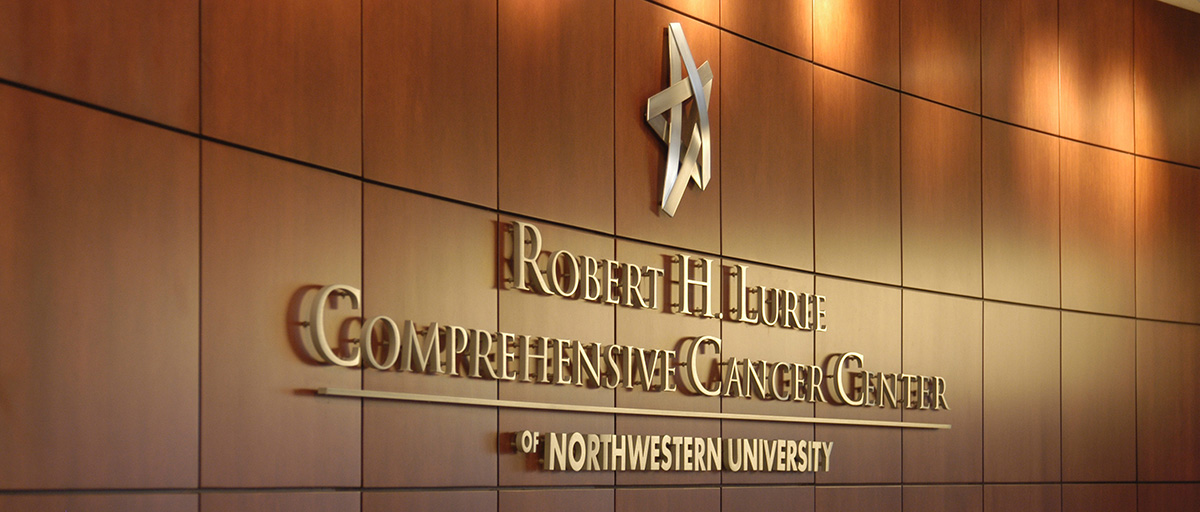
In 1991, the Robert H. Lurie Comprehensive Cancer Center of Northwestern University was dedicated through a gift of endowment from Ann and Robert H. Lurie. Fueled by philanthropy, Lurie Cancer Center's clinicians and scientists are empowered to push boundaries, break down barriers and transform the future of cancer care.
Learn about our Campaign for the Future

Founded in 1974, Northwestern’s Cancer Center was dedicated in 1991 through a gift of endowment from Ann and Robert H. Lurie.
The title was modified in 1997, when the Robert H. Lurie Comprehensive Cancer Center of Northwestern University received the NCI’s prestigious “Comprehensive” designation, a reflection of our dedication to the highest standards of cancer research, patient care, education, and community outreach.
“Is the Lurie Cancer Center a ‘better place’ for cancer care than it was 30 years ago? Of course. The irony of cancer care is that if you are ‘good’ but not ‘getting better,’ you're not doing your job! And if you operate by this ever-evolving concept of ‘getting better,’ HOPE is a constant.” - Ann Lurie
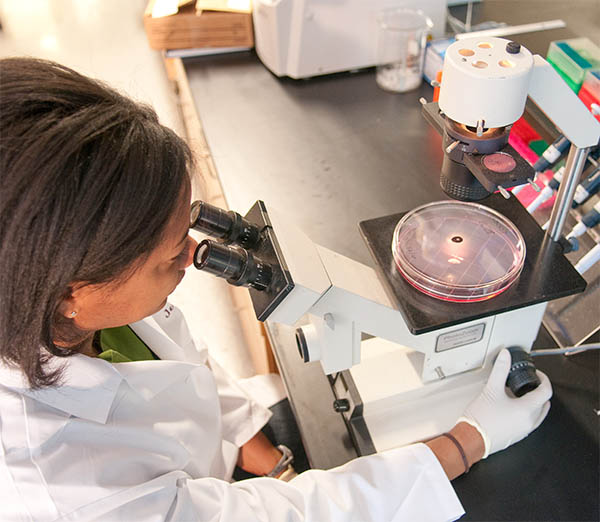
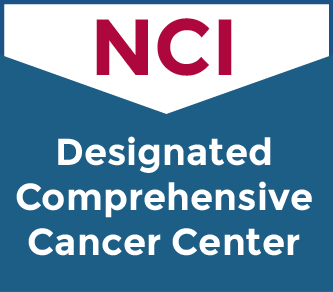

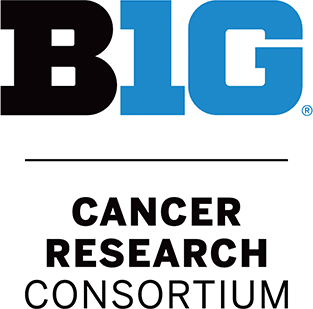
© Robert H. Lurie Comprehensive Cancer Center
of Northwestern University
cancer.northwestern.edu | cancer@northwestern.edu